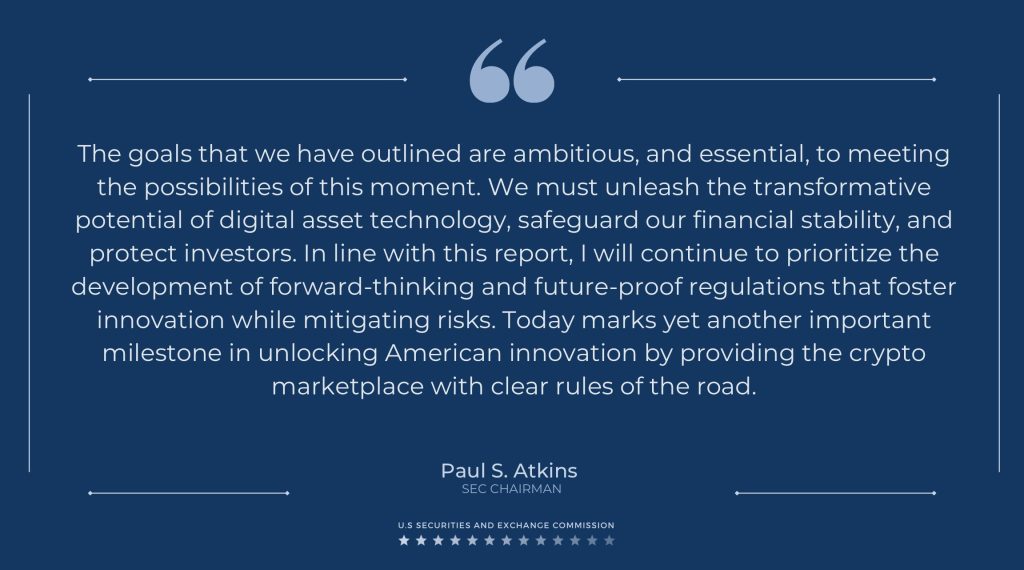SEC’s ’Project Crypto’ Aims to Crown America as Undisputed Global Crypto Hub by 2025
The SEC just dropped a bombshell—and Wall Street's scrambling to keep up. 'Project Crypto' isn't just another regulatory framework; it's a full-throttle play to dominate the $2.3 trillion digital asset market. Forget 'guidance'—this is the US government loading the moonshot rockets.
Wall Street Meets Blockchain—Finally
After years of playing defense, the SEC's new blueprint flips the script: streamlined token listings, sandboxed DeFi experiments, and (gasp) actual clarity on stablecoins. Insider whispers suggest Coinbase's legal team popped champagne—while traditional banks quietly updated their resumes.
The Fine Print That'll Make or Break Crypto
Buried in the 87-page doc? A killer clause letting institutions custody crypto without jumping through 37 regulatory hoops. Cynics note it suspiciously drops right as BlackRock files for its eighth Bitcoin ETF—but hey, 'coincidence' built this industry.
One hedge fund manager put it best: 'They're not just opening the door—they're installing a diamond-encrusted turnstile.' Now watch every VC in Silicon Valley sprint through it.
The initiative follows the release of a 166-page White House report titled “,” which categorizes cryptocurrency as “” alongside railroads and the internet.
The document condemns the Biden administration’s regulatory approach as creating a “hostile environment” for crypto businesses and calls for reversing policies that drove fintech firms offshore.
Framework Targets Onshoring Crypto Businesses Through Clear Guidelines
Project Crypto seeks to establish clear rules for crypto asset distributions, custody, and trading through public notice and comment procedures.
Atkins directed Commission staff to draft regulations addressing the confusion surrounding the Howey test, which has led entrepreneurs to treat all crypto assets as securities prophylactically.
The SEC plans to develop guidelines helping market participants categorize crypto assets as digital collectibles, digital commodities, or stablecoins based on economic realities.
Atkins also emphasized that being deemed a security should not carry stigma, noting that many issuers prefer the flexibility securities laws afford for product design and investor protections.
The initiative includes purpose-fit disclosures, exemptions, and SAFE harbors for initial coin offerings, airdrops, and network rewards. Atkins stated that the goal is to ensure issuers include Americans in distributions rather than excluding them to avoid legal complexity.

The SEC will also address tokenized securities requests from Wall Street firms and Silicon Valley unicorns seeking to distribute tokenized stocks, bonds, and partnership interests within the United States.
Atkins reported that firms are “lined up at our doors” requesting tokenization capabilities previously available only offshore.
Super-App Vision Facilitates Integrated Trading Platforms
The SEC plans to allow securities intermediaries to offer comprehensive services under a single license through “super-app” functionality.
Broker-dealers with alternative trading systems could offer trading in non-security crypto assets alongside crypto asset securities, traditional securities, and services like staking and lending without requiring multiple federal or state licenses.
Atkins directed staff to develop frameworks allowing non-security crypto assets and crypto asset securities to trade side-by-side on SEC-regulated platforms. The Commission will evaluate its authority to permit non-security crypto assets subject to investment contracts to trade on unregistered venues.
The approach allows state-licensed crypto platforms not registered with the SEC to list certain crypto assets while allowing CFTC-regulated platforms to offer products with margin capabilities. As a result, the approach eliminates the need for additional Congressional authority while unlocking greater asset liquidity.
Project Crypto also addresses outdated custody requirements that limited custodial service provider options.
The SEC plans to modernize custody rules for registered intermediaries, moving away from the previous administration’s “special-purpose broker-dealer” framework and SAB 121 guidance.
![]() Vanessa A. Countryman, Secretary of the SEC, confirmed that SAB 122 has officially replaced SAB 121 in the regulatory framework.#SAB121 #CryptoAccounting #USSEChttps://t.co/feyCzuakYH
Vanessa A. Countryman, Secretary of the SEC, confirmed that SAB 122 has officially replaced SAB 121 in the regulatory framework.#SAB121 #CryptoAccounting #USSEChttps://t.co/feyCzuakYH
Innovation Exemption Speeds Market Entry for New Business Models
The SEC is considering an innovation exemption that WOULD allow registrants and non-registrants to quickly enter markets with new business models that don’t fit existing regulations, for which a similar standard was released for ETFs earlier today.
![]() SEC establishes new crypto ETF listing standards enabling approximately dozen major digital assets to gain approval by October through streamlined framework.#SEC #ETFshttps://t.co/grlJtGb5tH
SEC establishes new crypto ETF listing standards enabling approximately dozen major digital assets to gain approval by October through streamlined framework.#SEC #ETFshttps://t.co/grlJtGb5tH
Innovators could comply with principles-based conditions, achieving Core securities law policy goals rather than burdensome prescriptive requirements.
Proposed conditions include periodic Commission reporting, whitelisting functionality, and restrictions on tokenized securities not adhering to compliant token standards like ERC3643.
Atkins also emphasized commercial viability as the “true north” for evaluating various models.
Additionally, the initiative coincides with growing corporate adoption. A Deloitte survey found 23% of North American CFOs expect their treasury departments to use cryptocurrency within two years, rising to nearly 40% among firms with $10 billion or more in revenue.
![]() Deloitte reports CFOs eye crypto treasury adoption, with governance, regulation, and workforce readiness emerging as next-phase priorities.#deloitte #treasuryhttps://t.co/boA1QnYOwm
Deloitte reports CFOs eye crypto treasury adoption, with governance, regulation, and workforce readiness emerging as next-phase priorities.#deloitte #treasuryhttps://t.co/boA1QnYOwm
Forty-three percent cited price volatility as their top concern, followed by accounting complexity and regulatory uncertainty.
The White House report also confirms plans for a strategic bitcoin reserve administered by the Treasury, though it admits the reserve is not yet operational.
The document calls for Congress to affirm people’s rights to self-custody digital assets and engage in peer-to-peer transactions without financial intermediaries.
Despite these positive regulatory announcements, Bitcoin is still trading relatively flat, slightly above $118,000, with ethereum gaining modestly above $3,760.

